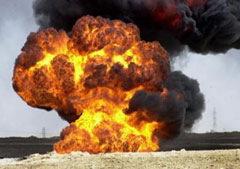|
Six European soldiers killed in Iraq attack
(Agencies)
Updated: 2004-06-10 08:56 An attack by insurgents caused the deaths of the
six eastern European soldiers working in a demining operation, officials said
Wednesday.
Officials initially had said the deaths were caused by an accidental
explosion, CNN reported.

An oil pipeline
burns in the desert near Beiji, Iraq about 250 kilometers (155 miles)
north of Baghdad Wednesday June 9, 2004. Saboteurs blew up the pipeline
Wednesday, forcing a 10 percent cut in output for the national electricity
grid, Iraqi officials said. [AP] | Three Slovaks, two Poles and one Latvian died in Tuesday's attack, according
to Polish Maj. Slawomir Walenczykowski. The soldiers were killed near As
Suwayrah, south of Baghdad.
Lt. Col. Robert Strzlecki said four mortar rounds were fired, including one
that struck an ammunition depot the coalition forces used for demining purposes.
Artillery shells and other ammunition exploded in the attack.
The news tempered news of the rescue of Polish hostage, Gerzy Kos.
Kos was one of two employees of a construction company kidnapped June 1 from
their Baghdad homes by "unknown individuals," the Polish-led command said.
Three Italian hostages also were freed in an operation Tuesday led by Polish
and U.S. special forces.
Bush wants increased NATO presence
President Bush said Wednesday he hopes the NATO alliance will take on a
bigger role in Iraq now that the United Nations has endorsed the country's
interim government.
"There's going to be some constraints, obviously. A lot of NATO countries are
not in a position to commit any more troops. We fully understand that," Bush
told reporters at the Group of Eight summit in Sea Island, Georgia. "But I do
think NATO ought to stay involved, and I think we have a good chance of getting
that done."
Several NATO members have contributed troops individually to the U.S.-led
occupation of Iraq, and the alliance provides support for the Polish-led
multinational division based south of Baghdad.
Bush said he discussed the prospect of additional NATO involvement with his
principal ally in the Iraq war, British Prime Minister Tony Blair, over
breakfast at the summit.
Resolution praised
Bush, Blair and Iraqi Interim Prime Minister Iyad Allawi praised the
unanimous passage Tuesday of the U.N. Security Council resolution that gives an
international stamp of approval to the new interim government.
The measure endorsed the June 30 transfer of sovereignty in Iraq and gave
authorization for a U.S.-led multinational force to stabilize the country.
Allawi said the government and multinational force will discuss "the
mechanics and mechanisms" for their deployment.
"The resolution is very clear that once Iraqi forces think it's fit then we
will ask them, the multinational forces, to leave Iraq," he said.
Blair said the "crucial thing now is that the people of Iraq know that
they've got the whole of the international community on [the] side for Iraq as a
stable and democratic country.
"And the terrorists and the fanatics and the extremists who are trying to
stop this democracy happening know they've got the whole of the world against
them. And that's the key."
The G-8 leaders were scheduled to meet Wednesday with Iraq's interim
president, Ghazi al-Yawar, and Bush said he was going to tell him "we're pulling
for him and pulling for the people of Iraq" and that the United States is
serious about the June 30 transfer of sovereignty.
"I'm also going to tell him that, when we say 'transfer of full sovereignty,'
we mean transfer of full sovereignty," Bush said.
Under the resolution, the interim government will serve until national
elections are held. The resolution says elections for a transitional national
assembly will be held on December 31 if possible and no later than January 31,
2005.
Pipeline attacks continue
Suspected insurgents attacked the main Kirkuk-Turkey oil pipeline Wednesday,
sparking a fire that continued to burn through the afternoon, an Iraqi police
official said.
The attack occurred 80 kilometers west of Kirkuk, according to Brig. Gen.
Torhan Abdul Rahman. The Kirkuk-Turkey pipeline is a major line with a diameter
of 40 inches.
"The ICDC [Iraq Civil Defense Corp] and other Iraqi security forces in the
north now expect these kind of attacks, especially on the pipelines after the
announcement from [interim Iraqi Prime Minister Iyad] Allawi which said that
Iraqi oil will soon be in the hands of Iraqis once again," the Kirkuk police
official said.
The explosion was the fourth on oil pipelines in northern Iraq in the past
three days. All of the blasts were set by improvised explosive devices.
Other developments
For the first time since it was formed last month, an Iraqi brigade
patrolling the Sunni Triangle town of Fallujah was attacked by insurgents,
police said. Five mortar rounds were fired at the base of the Fallujah brigade
Wednesday morning, wounding nine soldiers. Throughout April, fighting between
Marines and insurgents was intense in the town, west of Baghdad. The conflict
erupted after the March 31 killing and mutilation of four American private
security workers.
Two bodyguards of a local Baghdad politician were shot dead Tuesday,
according to the Coalition Press Information Center. The politician, a member of
the Al Rashid District Advisory Council, was wounded in the attack, carried out
by suspected insurgents wielding small arms. The council member, whose identity
was not immediately available, suffered wounds to the leg, shoulder and chest.
He is in serious but stable condition at a hospital.
Suspected guerrillas wounded two civilian contract drivers in a strike on a
coalition convoy in eastern Baghdad Wednesday, according to the Coalition Press
Information Center.
| |
 |
|
 |
|
|
Today's
Top News |
|
|
|
Top World
News |
 |
|
 |
|
|
|
|
|
|


